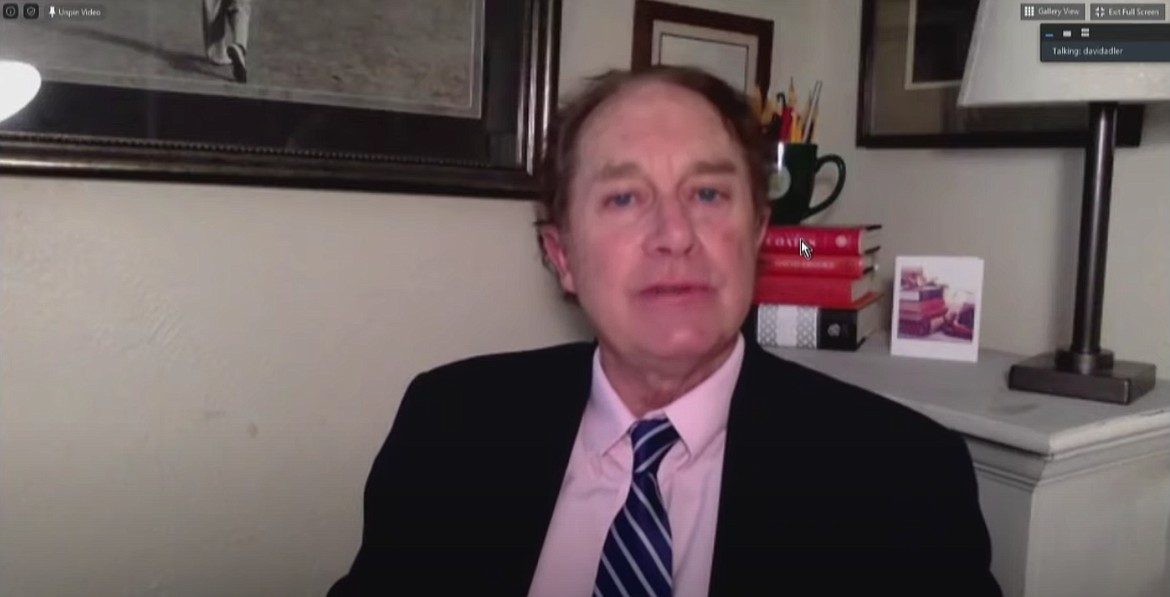Adler speaks to constitutional balancing act during national emergencies
A constitutional scholar with long-standing ties to Coeur d’Alene said the recent restrictions placed on Americans amid the coronavirus crisis evoke policies that date back millenia.
“Emergency powers travel back in time,” Dr. David Adler said Thursday evening, “century after century, all the way at least to Roman law, where governmental authority to act in emergencies was extended and expanded so as to work on behalf of the public welfare.”
Adler spoke of the constitutionality of emergency actions during his annual lecture. The yearly event — sponsored by the Coeur d’Alene Press, the Alturas Institute, the Friends of the Coeur d’Alene Library and CDA-TV — was scheduled to be held earlier this year at its usual perch in the library’s community room, but the COVID-19 pandemic forced organizers to turn to the virtual space of Zoom.
“The reality is,” Adler said, “for the past several months, Americans have begun to operate under new circumstances, new rules of behavior, in an effort to defeat the coronavirus … We wonder, ‘What can our government at all levels — local, county, state and certainly national — do to combat the virus and to take us to a new state of perhaps renewed normalcy?’”
The Adler Lecture, always a popular local draw, brought in more than 700 record views, library communications coordinator David Townsend said. This year’s topic, executive powers and congressional oversight in response to national emergencies, talked first about the role and limitations of the president’s reach and how the Constitution hands the power to deal with emergencies to Congress.
“When the framers thought about emergency powers, they immediately understood those to be legislative powers,” Adler explained, “legislative powers because laws are passed to respond to events, in times of tranquitlity as well as times of emergency.”
Adler recited the history of legislative powers, including the Necessary and Proper and the War Power clauses of the Constitution, before looking to the broader abilities of governors granted by state legislatures. In particular, he focused on how governors — including Idaho Gov. Brad Little — issued orders that shuttered churches and restricted movement, sparking protests in North Idaho.
“When Gov. Little issued his order for stay-at-home and prohibited all but essential businesses from opening, he was acting on the basis not of power granted to the governor necessarily, but on the basis of statutory authority,” Adler explained, “which provides that the state legislature has delegated broad emergency powers to the governor that can reach to the regulation and the denial of the exercise of certain property interests, for example, and certain liberty interests. Once the governor declares a state of emergency, that declaration triggers very broad statutory authority delegated to the governor. That’s what Gov. Little’s orders have rested on since his initial order.”
Adler then unpacked how government authority carries heavier weight during times of mortal danger.
“Some Idahoans and some others have claimed, for example,” he said, “that an order that restricted gatherings in certain public places … violated their First Amendment rights to freedom of assembly, they certainly were acting on the basis of their accrued knowledge about the very important First Amendment right to freedom of assembly, but forgetting, I think, that as the Supreme Court has said now for some 200 years that those liberties can be restricted by the state police power in the name of the greater public interest. And when we have a public health crisis, that police power is at its greatest height.”
That balancing act, Adler added, is what defines the essence of constitutional law: that no government authority or personal freedom is limitless.
“In a constitutional system, we should say, it would be unacceptable to embrace the assertion of unlimited governmental power,” he said, “just as it would be untenable to embrace the assertion of unlimited individual liberties.”
Adler’s Thursday lecture can be found on the library’s Facebook page and on CDA-TV’s YouTube page.

